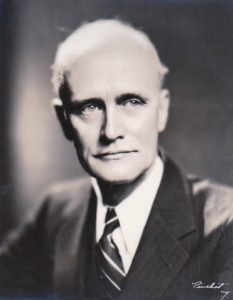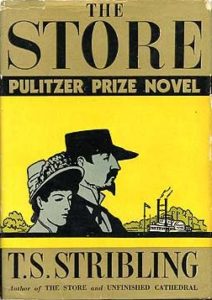Forgotten but Not Gone
T.S. Stribling, who won a Pulitzer Prize in 1933, deserves an important place in Southern literary study
T.S. Stribling was a pioneer figure in Southern literature during the early twentieth century. He achieved his greatest—though fleeting—recognition for his realistic portrayal of the hill country of south-central Tennessee and northwest Alabama. His novels offer stark depictions of black and white, rich and poor, people sadly lacking the devices to win their collective freedom from the burdens of Southern history.
 Stribling was born in Clifton, Tennessee, on March 4, 1881. He earned a law degree from the University of Alabama, but he always pursued a career as a writer and was consistently a man of the world, living in New York and Florida, traveling in Europe, the Caribbean, and Venezuela.
Stribling was born in Clifton, Tennessee, on March 4, 1881. He earned a law degree from the University of Alabama, but he always pursued a career as a writer and was consistently a man of the world, living in New York and Florida, traveling in Europe, the Caribbean, and Venezuela.
In a publishing career that spanned nearly sixty years, Stribling produced Sunday-school moral stories, melodramatic romance adventures, ingenious science fiction, and innovative detective fiction, becoming one of the bestselling novelists between the world wars. Featuring an excoriating examination of socioeconomic change, race relations, miscegenation, and general social regression in the South, his novels Birthright (1922) and Teeftallow (1926), among others, established him as a critically acclaimed voice of social realism. These novels and short stories of the 1920s and 1930s placed him in the vanguards of both the Harlem and the Southern literary “renaissances” of the early twentieth century.
Teeftallow was also a bestseller and one of the first selections of the Book of the Month Club; The Forge (1931) became the first book by an American author to be chosen by the English Book Society as its book of the month. The Literary Guild included The Store (1932), Unfinished Cathedral (1934), and The Sound Wagon (1935) as monthly selections. In the 1930s, Stribling wrote more book-club novels than any other American author. The Store was awarded the Pulitzer in 1933, the first work from Tennessee to win the prize, for its stark depiction of Southern racial injustice.
In this groundbreaking novel and others—Birthright, Bright Metal, The Forge, and Unfinished Cathedral—Stribling pointed out the harsh reality of white suppression of blacks, the adverse conditions of sharecropping, the destructive influence of rampant materialism, and the stagnation of provincial closed-mindedness. His works demonstrated the rich material available to Southern writers and helped to create a modern Southern literature. His books also serve as insightful social histories of the hills of south central Tennessee and northwest Alabama.
 In addition to his novels, Stribling produced numerous short stories, including a lucrative series that ran in The Saturday Evening Post from 1935 to 1942. By the mid-1940s, despite this popular and critical success, T. S. Stribling had disappeared from the view of the mainstream reading public. After 1938, he published no more novels, though he completed seven unpublished manuscripts from 1939 until his death in 1965. In the 1940s and 1950s, his publishing output consisted of a series of detective stories published in Ellery Queen’s Mystery Magazine.
In addition to his novels, Stribling produced numerous short stories, including a lucrative series that ran in The Saturday Evening Post from 1935 to 1942. By the mid-1940s, despite this popular and critical success, T. S. Stribling had disappeared from the view of the mainstream reading public. After 1938, he published no more novels, though he completed seven unpublished manuscripts from 1939 until his death in 1965. In the 1940s and 1950s, his publishing output consisted of a series of detective stories published in Ellery Queen’s Mystery Magazine.
Students of the Southern Renaissance tend to overlook Stribling’s influence largely because of his lack of innovation in writing style: though he was a contemporary of William Faulkner, Ernest Hemingway, and John Dos Passos, he continued to rely on social realism as his primary narrative strategy. His formulaic technique, crude prose, and use of regional dialect, as well as his frequent inclusion of current social issues (the Scopes Trial in Teeftallow, for example, or the infamous Scottsboro Boys case in Unfinished Cathedral), limited the longevity of his critical appeal. Writers like Faulkner, Thomas Wolfe, Erksine Caldwell, and Robert Penn Warren took the themes Stribling introduced and immortalized them. In turn, their artistry and craft outstripped Stribling, leaving him unrecognized and forgotten, though his commitment to realistic social fiction deserves an important place in Southern literary and historical study.
Stribling never let critical reception impact his approach to his craft. Writing should be “the expression of your individuality,” he once wrote. “And when you express it, it flowers into something finer than it was. You cannot look upon life with understanding and sympathy and not become a better person yourself.”
T. S. Stribling died on July 8, 1965, and his tombstone in the Clifton Cemetery, bears this epitaph: “Through This Dust These Hills Once Spoke.” His former home in Clifton is now the T. S. Stribling Museum.

Kenneth W. Vickers is a native of Middleton, Tennessee. A Ph. D. graduate of Mississippi State, he is currently coordinator of the history program and an associate professor of history at Martin Methodist College in Pulaski, Tennessee. Vickers is the author of T. S. Stribling: A Life of the Tennessee Novelist, which was published by the University of Tennessee Press in 2004.

This essay is part of the Pulitzer Prize Centennial Campfires Initiative, a joint venture of the Pulitzer Prize board and the Federation of State Humanities Council in celebration of the 2016 centennial of the Prizes. For their generous support of the Campfires Initiative, we thank the Andrew W. Mellon Foundation, the Ford Foundation, Carnegie Corporation of New York, the John S. and James L. Knight Foundation, the Pulitzer Prizes board, and Columbia University.

